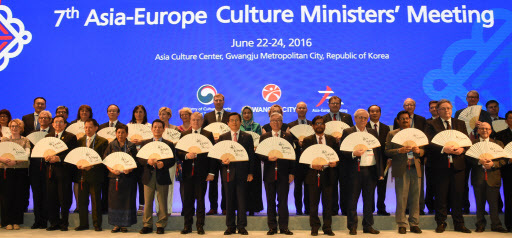GWANGJU (Yonhap) -- Prime Minister Hwang Kyo-ahn on Thursday said that the international community should further cultural cooperation since the power of culture can contribute greatly to world unity.
“I think the power of culture can go beyond borders, greatly contributing to making the world into one beautiful community,” Hwang said during a speech at the formal opening ceremony for the seventh Asia-Europe Culture Ministers’ Meeting in Gwangju.
“So, in that sense, cultural cooperation of the international society, including the Asia-Europe Meeting, should be further enhanced.”
The three-day meeting began Wednesday under the theme “culture and creative economy,” bringing together some 160 delegates from 45 ASEM member countries to the Asia Culture Center, a state-run arts and concert venue in Gwangju, located 330 kilometers south of Seoul.
The “creative economy” is President Park Geun-hye’s flagship policy of turning new and creative ideas into real business opportunities, with the help of cutting-edge science and information technology.
The officials will share their governments’ experiences in cultivating creative industries, which include films, music, television and video games among other sectors, widely considered the new growth engine for the future.
“There is no border in culture. Cultural content converged with information-communication technology is uniting the world into one transcending time and space,” Hwang said. “In this era of the creative economy, the world is paying attention to the power of culture.”
Top delegates from each country took part in a commemorative photograph holding a traditional Korean fan they received as a gift from the host country in one hand. They also took part in a hand-printing event. Bronze casts of their hand prints will be put on display permanently at the ACC’s international conference hall.
 |
Culture ministers from the Asia-Europe Meeting member countries pose for a photo at the opening ceremony of the 7th Asia-Europe Culture Ministers Meeting at the Asia Culture Center in Gwangju on Thursday. (Yonhap) |
The ceremony was followed by a main session where participants introduced their government's policies for nurturing creative industries.
After the session, there will be three sub-panel meetings, with one each on “the future of cutting-edge technologies and the creative industries,” “traditional culture and the creative economy” and “the creative industries and international cooperation.”
The three meetings will be respectively led by Minister Felipe Je. De Leon of the Philippines and Marjan Hammersma, vice minister of the Netherlands; Minister Asaduzzaman Noor of Bangladesh and Polish Deputy Premier and Culture Minister Piotr Tadeusz Glinski; and ministers Vira Rojpojchanarat of Thailand and Aristeidis Nikolaos Dimitrios Baltas of Greece.
In a special session on Thursday, Korea will present its policy of creating the Culture Creation Convergence Belt as a model case of fostering the industries.
Seoul began creating the belt, composed of a creative convergence center, a creative venture center, an academy and a cluster of cultural performance facilities, early last year to help tech venture startups work with each other to develop and commercialize creative ideas in the field of culture and the arts.
The belt, moreover, aims to foster talent in the culture and content industries.
Kim Jong-deok, Korea’s minister of culture, sports and tourism, will announce a statement in his capacity as chairman of the meeting on Friday.
Launched in Beijing in 2003, the Asia-Europe Culture Ministers’ Meeting has been held biennially rotating back and forth from Asia to Europe with the purpose of facilitating cultural exchanges and cooperation among the member countries. The last meeting was held in the Netherlands in 2014.
ASEM is an exclusively Asian-European forum to enhance relations and promote political, economic and other exchanges with 51 countries as its members. This marks the first time for Korea to host the event.




![[Weekender] Korea's traditional sauce culture gains global recognition](http://res.heraldm.com/phpwas/restmb_idxmake.php?idx=644&simg=/content/image/2024/11/21/20241121050153_0.jpg)



